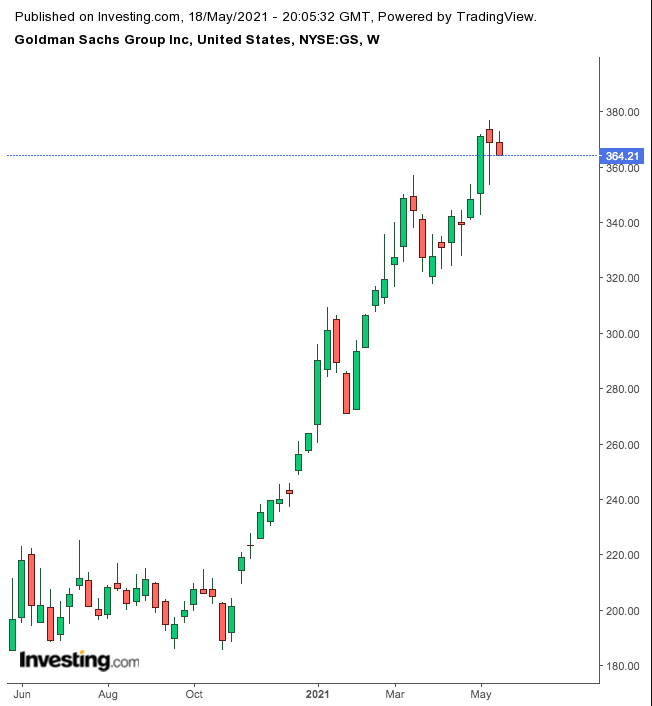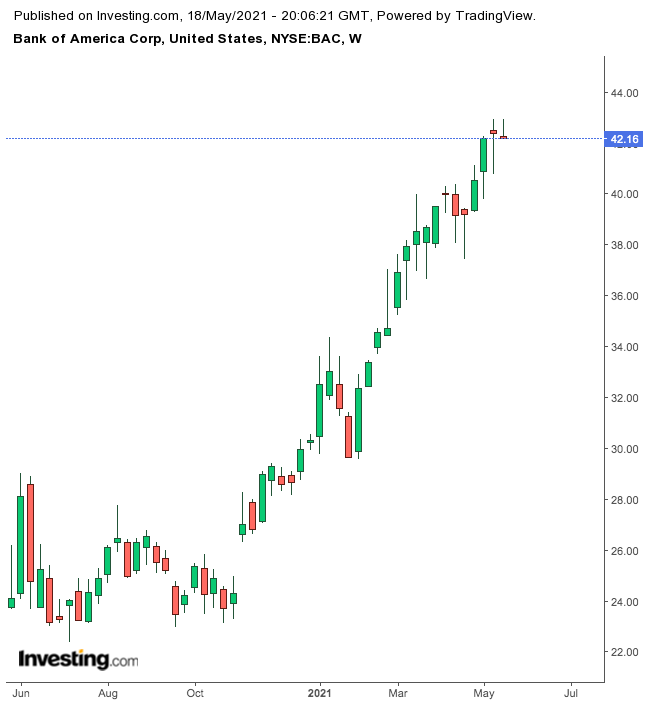Some of the world’s largest financial institutions are going through a powerful rebound after dealing with the severe blow from the COVID-19 pandemic.
U.S. bank stocks have outperformed the benchmark S&P 500 Index by a big margin this year. Investors are now bullish on lenders, believing that the worst is over and the economic reopening will fuel revenue expansion.
The KBW Bank Index has jumped about 40% so far this year, led by JPMorgan Chase (NYSE:JPM), Goldman Sachs (NYSE:GS) and Bank of America (NYSE:BAC). Over the same period, the S&P 500 gained just 10%.
In the wake of this impressive performance, many investors feel they may have have already missed this financials boat.

That observation may be true from some individual lenders, but the overall macro picture still looks quite favorable for large lenders that have diversified revenue streams and are well-positioned to benefit from both low and gradually rising interest rate environments.

One of the biggest factors that could fuel more earnings strength in the months ahead is the pent-up demand for credit that got hammered during the pandemic. From individual borrowers to large corporations, 2020 was the year when spending plans were scrapped as lockdowns forced potential borrowers to preserve cash and cut costs.

That situation is unlikely to persist if the U.S. economy fully reopens as planned this year. Combined with the government’s massive infrastructure spending, and a gradual tapering off monetary stimulus, banks could see demand for credit pick up substantially during the rest of 2021.
Exceeding Expectations
In addition to growing credit demand, strong activity in capital markets—ranging from higher trading volumes to big M&A deals and equity offerings—will continue to pick up the slack.
JPMorgan and Goldman Sachs, for example, have shown consistently during the pandemic that they can adapt to any economic and market conditions and find a way to exceed expectations. Last year, when overall economic activity was extremely depressed, these lenders seized on financial market volatility to make more money via their investment units.
Adding to this optimism is the accelerating rate of inflation, signaling that the Federal Reserve will likely be forced to raise interest rates earlier than anticipated to ward off price hikes. Higher rates allow banks to charge more to borrowers, boosting lending margins on a variety of products from credit cards to mortgages.
Even with the strong performance this year, bank stocks are still attractive when compared with the border market. Banks trade at around 13 times their expected 2022 earnings, while the S&P 500 trades at more than 22 times, a wider gap than the historical average.
According to Deutsche Bank analysts cited in a Wall Street Journal report, the market hasn’t yet priced in potential economic strength for 2023 and 2024, which could lift bank earnings even further, producing 25-50% gains in their stock prices during that time.
Bottom Line
The economic backdrop is still favorable for banks' earnings growth this year, making their shares attractive even after a powerful run.
Investors who want some banking exposure might consider adding such solid names as JPM, Goldman Sachs and Bank of America to their portfolios. These top lenders, due to their diversified business models, are in a better position to outperform than smaller regional players.
